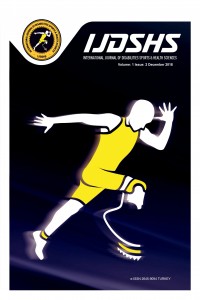Abstract
References
- Berryman JW. (2003). Ancient and early influences. In: Tipton CM, ed. Exercise Physiology: People and Ideas. New York: Oxford University Press, 1-38.
- Brooks GB, Fahey TD, White TP, Baldwin KM., (2000). Exercise Physiology. 3rd ed. Mountain View, CA
- Kenney, W. L., Wilmore, J. H., Costill D. L. (2012). Physiology of Sport and Exercise, Fifth Edition. Human Kinetics, Champaign: 2-21
- Kurdak, SS. (2019). History of Exercise physiology, Ünal, M. (Eds), Exercise Physiology, 1st Edition, (pp9-10), Istanbul Medical Publishing House
- Plowman, S.A., Smith D.L. (2014). Exercise Physiology For Health, Fıtness, And Performance, 4th Edition Williams and Wilkins, Baltimore,
- Porcari, J. P., Bryant,C. X., Comana, F. (2015). Exercise Physiology. F. A. Davis Company: 4
- Powers SK, Howley ET. (2004). Exercise Physiology. 5th ed. Boston: McGraw-Hill.
- Robergs RA, Roberts SO. (1997). Exercise Physiology. St. Louis: Mosby.
Abstract
Although the physiology of exercise developed with a multidisciplinary approach is dynamic and exciting for the 21st century, it is important to know how to use the laboratory devices and equipments which is essential to conduct scientific researches in this field. Sixteen human performance laboratories in USA and thirteen human performance laboratories (HPL) in Turkey and the current status of the devices and equipments which exist in these laboratories have been examined in this study. The present material in the human performance laboratories was evaluated to provide the measurement based on 7 specific areas (1. Pulmonary functions 2. Muscle strength, endurance and flexibility 3. Walking analysis, biomechanics and movement analysis 4. Cardiovascular functions 5. Body composition 6. Reaction time and balance 7. Competition analysis systems for coaches) determined by the researchers and 43 devices and equipment which should be present in the laboratories were determined with the help of the survey conducted as a result of face-to-face interview. According to the results of the descriptive parameters of the current investigation it was found that devices and equipments that enable to examine lung function, muscle strength and stamina, body composition, isokinetic dynamometers, reaction time and balance tests were relatively prevalent in Turkish HPL while cardiovascular system analysis, gait analysis, biomechanics, motion analysis, video analysis and flexibility measurements were less common compared to American Universities. Consequently, there are similarities and differences between Turkish and American HPLs in terms of devices, measurement tools and equipments which are essential in exercise physiology field.
References
- Berryman JW. (2003). Ancient and early influences. In: Tipton CM, ed. Exercise Physiology: People and Ideas. New York: Oxford University Press, 1-38.
- Brooks GB, Fahey TD, White TP, Baldwin KM., (2000). Exercise Physiology. 3rd ed. Mountain View, CA
- Kenney, W. L., Wilmore, J. H., Costill D. L. (2012). Physiology of Sport and Exercise, Fifth Edition. Human Kinetics, Champaign: 2-21
- Kurdak, SS. (2019). History of Exercise physiology, Ünal, M. (Eds), Exercise Physiology, 1st Edition, (pp9-10), Istanbul Medical Publishing House
- Plowman, S.A., Smith D.L. (2014). Exercise Physiology For Health, Fıtness, And Performance, 4th Edition Williams and Wilkins, Baltimore,
- Porcari, J. P., Bryant,C. X., Comana, F. (2015). Exercise Physiology. F. A. Davis Company: 4
- Powers SK, Howley ET. (2004). Exercise Physiology. 5th ed. Boston: McGraw-Hill.
- Robergs RA, Roberts SO. (1997). Exercise Physiology. St. Louis: Mosby.
Details
| Primary Language | English |
|---|---|
| Subjects | Sports Medicine |
| Journal Section | Articles |
| Authors | |
| Publication Date | December 25, 2018 |
| Published in Issue | Year 2018 Volume: 1 Issue: 2 |


